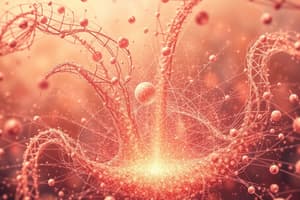Podcast
Questions and Answers
Which property of gases generally decreases with increasing temperature?
Which property of gases generally decreases with increasing temperature?
- Volume
- Solubility (correct)
- Conductivity
- Pressure
What is the pressure exerted by a vapor in equilibrium with a liquid called?
What is the pressure exerted by a vapor in equilibrium with a liquid called?
- Vapor density
- Vapor pressure (correct)
- Vapor resistance
- Vapor tension
In the liquid state, what does the enthalpy of fusion refer to?
In the liquid state, what does the enthalpy of fusion refer to?
- Energy required for solidification
- Energy required for vaporization
- Energy required for melting (correct)
- Energy required for sublimation
What does the mole fraction of a gas represent?
What does the mole fraction of a gas represent?
What is the general trend for solubility of solids with increasing temperature?
What is the general trend for solubility of solids with increasing temperature?
According to the kinetic theory, which of the following is a basic assumption of an ideal gas?
According to the kinetic theory, which of the following is a basic assumption of an ideal gas?
Which statement best describes the behavior of noble gases such as helium and neon according to the kinetic theory?
Which statement best describes the behavior of noble gases such as helium and neon according to the kinetic theory?
What is a limitation of the ideal gas laws according to the kinetic theory?
What is a limitation of the ideal gas laws according to the kinetic theory?
Under what conditions do gases behave ideally according to the kinetic theory?
Under what conditions do gases behave ideally according to the kinetic theory?
What makes real gases deviate from ideal gas behavior at low temperatures according to the kinetic theory?
What makes real gases deviate from ideal gas behavior at low temperatures according to the kinetic theory?




